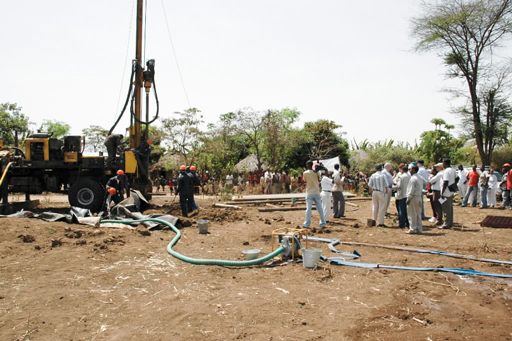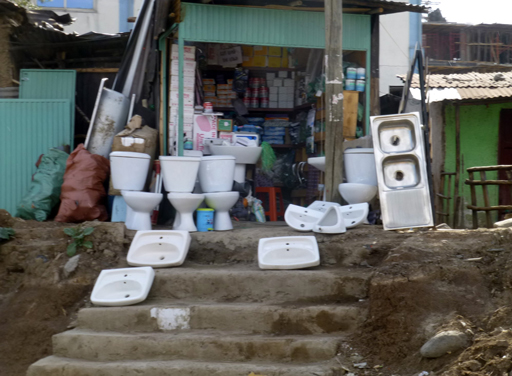9.4 Private sector
The private sector contributes to the implementation of the OWNP by constructing water supply and sanitation facilities. The private sector is the part of a country’s economy that is not run by the government. Private sector businesses are usually run with the aim of making a profit. In the WASH sector the tasks undertaken by private sector companies may include such things as the design and engineering of new facilities, drilling boreholes, laying pipes and constructing buildings, as well as supplying materials and equipment (Figure 9.3). Implementation also involves studies and research by different professional associations. These activities are usually undertaken by private contractors, consultants, suppliers and artisans.


Which type of stakeholder are these private sector groups?
These are collaborating stakeholders because they do not provide funds for WASH activities.
There is a growing demand for groundwater development and borehole drilling in Ethiopia, however only a limited number of private drilling companies are available to carry out the work. To try to alleviate this problem, the government has suppled drilling machines to Regional State Water Enterprises (RSWEs) which bid for contracts for drilling and construction of water supplies in the same way as private enterprises, e.g.Oromia Water Works and Construction Enterprise, Amhara Water Works and Construction Enterprise. These are profit making but are established by the government and work on construction of water supply schemes for rural and urban areas, consultancy work, etc.
Also classified as a private sector stakeholder is the Ethiopian Association of Hydrogeologists, which was established in 2006 with the objective of using groundwater for development and to assist the expansion of education and research about groundwater in Ethiopia. This association contributes to the OWNP by identifying the hydrogeological problems of the country and proposing solutions for the government based on its scientific research.
Banks and microfinance institutions also play an important role. Microfinance institutions (MFIs) operate in rural communites, giving small loans to individuals and small-scale enterprises. MFIs and banks provide financial services to communities, particularly for community-managed projects (CMP), self-supply and sanitation marketing activities. These services include financing through WASH Committees (WASHCOs) for procurement, construction, maintenance, rehabilitaton, replacement, insurance and for providing credit to small-scale micro-enterprises for WASH services and supplies.
The private sector also provides consultancy services for studies and analyses, design, construction supervision and other activities. Private suppliers, artisans and other service providers will have an increasingly important role to play in the OWNP in establishing and servicing supply chains for WASH products, spare parts and repair services, as well as in supporting self-supply activities. Supply chain means the sequence of steps or processes or added components involved in making a product from start to finish.
9.3.3 Development Assistance Group /Water Sector Working Group
